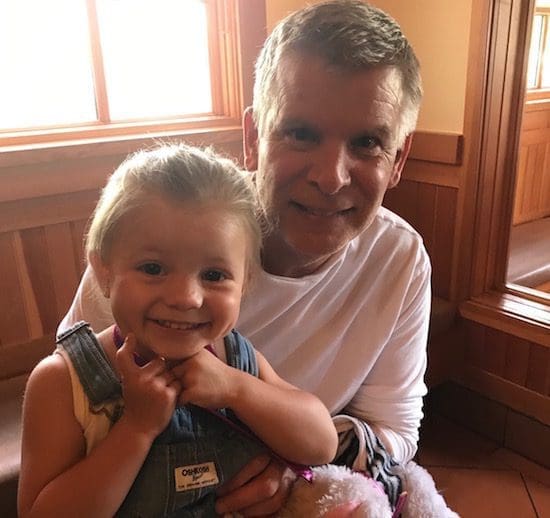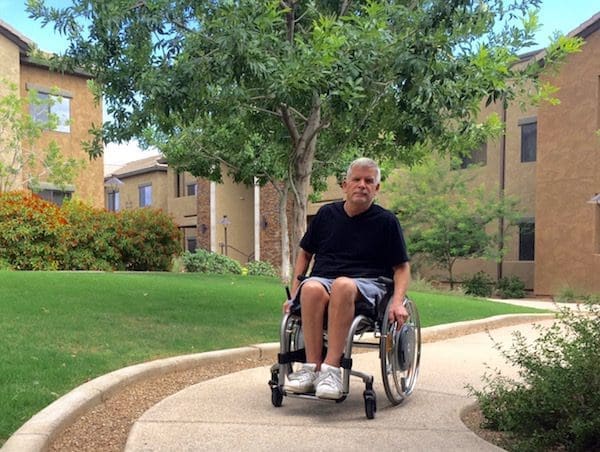I met him this past week at the coffee machine in my son and daughter-in-law’s Tucson apartment complex. We exchanged pleasantries and then I asked – shamelessly – how long he’d been in a wheelchair.
Photo: Marlys
Randy was in his thirties when he noticed numbness, weakness, and extreme fatigue. An MRI and multiple scans later, he was diagnosed with relapsing/remitting multiple sclerosis (MS). It progressed to the point where he wasn’t able to continue his line of work, so he went back to school and earned a teaching degree.
A wheelchair occupied a corner of his classroom, but during the course of his teaching career, Randy determined never to use it – a goal he achieved. Many of his sixth-graders relished helping him with the things he found challenging; they had questions about his illness, and they were certainly aware of the wheelchair in the room, but they never made it an issue.
As MS advanced—fatigue, the challenge of writing legibly, knowing he would soon need the wheelchair—Randy realized it was time to stop teaching. But not until after twenty years of hanging out with sixth graders in a classroom setting.
Randy has, and still is, facing tremendous loss: significant setbacks in health and mobility, forfeiture of rewarding work, an unexpected divorce after thirty-three years of marriage, and the ongoing loss from a disease that triggers a steady decline in function.
Because multiple sclerosis is unrelenting, so is grief. “I’m constantly battling grief and depression because it’s not as though I can get better.”
But Randy has a battle plan. And it includes keeping in touch with family, with his sons, reading inspirational books: “trying to not dwell on what I can’t do, but dwell on what I can do.”
Randy is also writing his story to help him deal more effectively with what’s happening – “more of a diary about myself, my feelings and challenges and struggles.” Randy tries to focus on the small things that still give him great joy and happiness. Like, time with his grandchildren: “reading, playing board games, helping with homework, going to their sporting events, trying to be an influence on their lives in that way.”

Randy with 3-year-old granddaughter
My brother-in-law recently sent a Wall Street Journal article by Kay S. Hymowitz entitled “Is There Anything Grit Can’t Do?” Bro-in-law suggested I write a blog about grit since he seems to think I’m gritty. (I wonder, now, if he meant I should improve my cleanliness habits.)
The article focuses on Angela Lee Duckworth, a 47-year-old University of Pennsylvania professor who won the 2013 MacArthur “Genius” grant. Ms. Duckworth defines grit as: “The tendency to pursue long-term goals with passion and persistence. … It’s not just about your talent and ability, it’s also about how much heart you put into it.”
Ms. Duckworth’s research, after testing the various likely alternatives, suggests that grit “predicts achievement in ways that neither conscientiousness nor IQ nor talent does,” whether those being tested were West Point cadets, salespeople at a time-share company, or National Spelling Bee competitors.
If anyone had grit, it was my husband, Gary. This man who rarely complained. This man who maintained his wicked, dry humor to the end – who said to a friend in the last week of his life: “It sure is hard to die with so many people visiting.” This man who lived full out with courage and tenacity through ten years of terminal disease.
* * *
I asked Randy why Language Arts, and why middle-schoolers. “I wanted to give these kids a good platform so they could be successful in life. Writing effectively and reading is so important.”
And what was the most rewarding aspect of teaching?
Without hesitation, he responded, “Having the students come back after a few years, telling me what they learned from me about life and subject matter.”
Wow, what better reward for grit than knowing you made a difference in the lives of so many young people through twenty years of teaching.
Randy’s body may be confined to a wheelchair, but his mind isn’t. He expressed despondency over not being able to give back. Tutoring, for example. He’d love to tutor, but due to the demands of MS, he’s limited in what he can take on.
I suspect he’s still being influential, though, because as we sat outdoors and talked in the shade near the pool, folks passing by spoke to him. “You know quite a few people in this complex, don’t you?”
“Nah,” he answered modestly.
“I bet you’re influencing more than you realize. I think you’re teaching these people how to live forward through life’s challenges.”
But Randy wouldn’t let me end on that note of making him out to be a hero. Because there’s so much more to deal with than just the disability. “I don’t want people to read this and think, ‘He’s doing so well.’ No, it comes with a lot of struggle and depression and pain. The small moments and joys are so important to grasp onto because you don’t have that many.”
And that takes grit.
Which begs the question: How gritty are you?
P.S. If you found this blog helpful or inspirational, please share, tweet or pin!


Sharon Brorson
I am not sure if I am very gritty…will have to get back to you on that question. I do so love reading your blog and feel that you are sharing your talent whenever you travel. How encouraging you were to Randy to ask him to share his story and you giving the gift of listening. How special the photo is of the granddaughter smiling on Randy’s lap. Thanks for inspiring so many people (myself included) and reminding us to connect more with people in our day to day life.
Stay well and know I miss you when you are “away from us” for too long.
Love,
Sharon
Marlys Johnson
Oh, girlfriend, you ARE gritty!
Karen
Thank you for introducing me to Randy. I am going through treatment for breast cancer and having a tough time dealing with the uncertainties. I pray that I may follow in his and your footsteps and meet this adversity with grit and courage. Please know that your stories are an inspiration and that I am thankful for you.
Marlys Johnson
The uncertainty can sometimes be the hardest thing to deal with, can’t it? Thank you for reading, Karen, and thank you for your kind words. Blessings and courage and grit to you during this challenging time of treatment and uncertainty.
Donna Wilkens
Thanks for including me in your blog. What a blessing and encouragement you are wherever you go. It was a blessing to met you and hope we see each other again!!
Marlys Johnson
No, thank YOU, Donna!